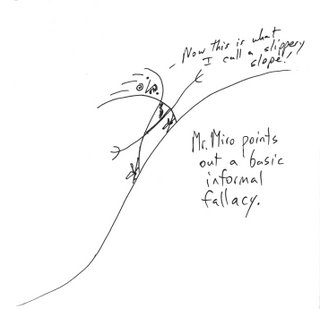
Many people mistake "criticism" as necessarily negative; of course it can be, but more importantly it deals with analysis.
There are terms, however, that get tossed about without comment, such as "begging the question." Someone "begs the question" when a person assumes what is supposed to be proven. A classic version is, "We know God exists because the Bible says so; and we know the Bible is true because it is the Word of God." (This was not asserted by a Quaker, of course, because we know that the Bible merely contains the "words of God": the Word of God, of course, is Jesus.) It's interesting to notice how often this happens, particularly since people don't notice. A good contemporary example is how our government treats people detained because they're suspected of being connected somehow to terrorism: they demand civil rights and humane treatment, but the Bush Administration continues to refer to them as terrorists. That begs the question; but then, critical thinking isn't a skill valued by either the Administration or the general public these days.
Sometimes people use "beg the question" as if it meant that a question "begs to be asked," but that's not technically correct. On the other hand, insisting on being technically correct can alienate you from people. To quote Nietzsche out of context once more: Crede experto
1 comment:
I've never understood "begging the question" well enough to explain it, just enough to know I shouldn't begin a sentence with, "So this begs the question, is anyone driving this thing?". So thanks.
But your first example is what I've always thought of as circular reasoning; is constructing such a precondition to begging the question?
Post a Comment